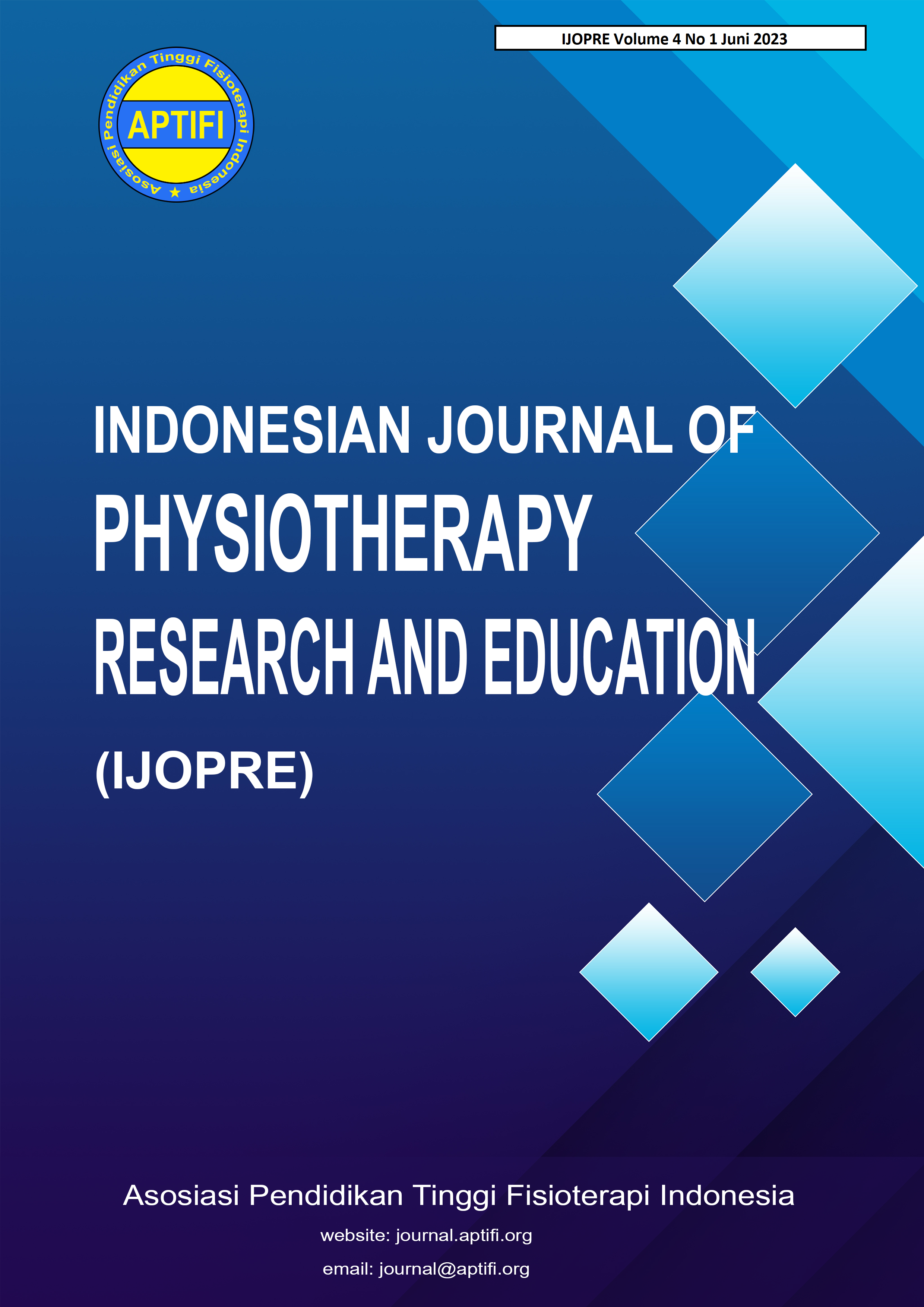Hubungan Antara Sudut Metatarsophalangeal I dengan Arcus Longitudinal Medial dan Tingkat Keseimbangan Dinamis
Abstract
Tujuan: Untuk mengetahui hubungan antara sudut metatarsophalangeal I dengan derajat keseimbangan dinamis dan arcus longitudinal medial pada pekerja wanita di Makassar.Metode: Jenis penelitian korelasional dengan desain cross sectional. pengambilan sampel dalam penelitian ini menggunakan teknik purposive sampling dengan jumlah sampel sebanyak 35 pekerja wanita, data primer melalui alat ukur sudut metatarsophalangeal I dengan goniometer kemudian dikategorikan berdasarkan Hallux Valgus Angle, mengukur derajat keseimbangan dinamis dengan uji keseimbangan Y kemudian dikategorikan berdasarkan skor rentang keseimbangan Y, pengukuran arcus longitudinal medial dengan sidik kaki basah dan dikategorikan oleh Clarke Index (CI).Hasil: Ada hubungan negatif yang signifikan antara sudut metatarsophalangeal I dengan derajat keseimbangan dinamis pada tungkai kanan (p= 0,002; r= -0,515) dan kiri (p= 0,0001; r= -0,599). Hasil analisis data juga menunjukkan semakin besar sudut metatarsophalangeal I, semakin rendah derajat keseimbangan dinamis. Selain itu, ada korelasi negatif yang signifikan antara sudut metatarsophalangeal I dan arcus longitudinal medial di kaki kiri (p= 0,031; r= -0,356).Kesimpulan: Semakin besar sudut metatarsophalangeal I, semakin rendah arcus longitudinal medial.
References
Aiyer, A., Stewart, S. and Rome, K. (2015) ‘The effect of age on muscle characteristics of the abductor hallucis in people with hallux valgus: a cross-sectional observational study’, Journal of Foot and Ankle Research. doi: 10.1186/s13047-015-0078-5.
Alkhaibary, A. et al. (2019) ‘Hallux valgus in Riyadh, Saudi Arabia: Prevalence, characteristics, and its associations’, Journal of Musculoskeletal Surgery and Research, 3(3), p. 292. doi: 10.4103/jmsr.jmsr_47_19.
Armand, S. (2016) ‘In : Orthopedic Management of Children with Cerebral Palsy’, in.
Atbası, Z. et al. (2020) ‘Relationship Between Hallux Valgus and Pes Planus: Real or Fiction?’, Journal of Foot and Ankle Surgery, 59(3), pp. 513–517. doi: 10.1053/j.jfas.2019.09.037.
Babu, D. and Bordoni, B. (2021) ‘Anatomy, Bony Pelvis and Lower Limb, Medial Longitudinal Arch of the Foot’, StatPearls. Available at: https://www.ncbi.nlm.nih.gov/books/NBK562289/ (Accessed: 16 December 2021).
Barbee, C. E. et al. (2020) ‘The effects of hallux valgus and walking speed on dynamic balance in older adults’, Gait and Posture, 80, pp. 137– 142. doi: 10.1016/j.gaitpost.2020.05.039.
Barnish, M. S. and Barnish, J. (2016) ‘High-heeled shoes and musculoskeletal injuries: a narrative systematic review’, BMJ Open, 6(1), p. 10053. doi: 10.1136/BMJOPEN-2015-010053.
Butterworth, P. A. et al. (2012) ‘The association between body mass index and musculoskeletal foot disorders: A systematic review’, Obesity Reviews, 13(7), pp. 630–642. doi: 10.1111/j.1467- 789X.2012.00996.x.
Chen, D. W. et al. (2014) ‘Anatomy and Biomechanical Properties of the Plantar Aponeurosis: A Cadaveric Study’, PLoS ONE, 9(1). doi: 10.1371/JOURNAL.PONE.0084347.
Cheney, N. et al. (2017) ‘Is a Flatfoot Associated with a Hallux Valgus Deformity?’, Foot & Ankle Orthopaedics, 2(3), p. 2473011417S0001. doi: 10.1177/2473011417s000133.
Daeli, N. E. and Frisca, S. (2020) ‘Korelasi Kejadian Bunion (Hallux Valgus) dengan Keseimbangan Tubuh pada Wanita Pengguna Sepatu Model High Heels’, Jurnal kesehatan, 8(1).
Davis, C. P. (2021) Medical Definition of Foot. Available at: https://www.medicinenet.com/foot/definition.htm (Accessed: 20 November 2021).
Glasoe, W. M., Nuckley, D. J. and Ludewig, P. M. (2010) ‘Hallux valgus and thefirst metatarsal arch segment: A theoretical biomechanical perspective’, Physical Therapy, 90(1), pp. 110–120. doi: 10.2522/ptj.20080298.
Goom, T. (2017) Plantar Plate injury, assessmentandmanagement.Avaiable at:https://www.runningphysio.com/plantar-plate/ (Accessed: 25 January 2022).
Heyes, G. J. et al. (2020) ‘Pes Planus Deformity and Its Association With Hallux Valgus Recurrence Following Scarf Osteotomy’, Foot & Ankle International,41(10), pp. 1212–1218. doi: 10.1177/1071100720937645.
Kementerian Kesehatan Republik Indonesia (2018) Infodatin Keselamatan dan Kesehatan Kerja.
Knudson, D. (2018) Fundamentals of Biomechanics, Angewandte Chemie International Edition, 6(11), 951–952.
Kuhn,J.andAlvi,F.(2021)‘HalluxValgus’.Availableat:https://www.ncbi.nlm.nih.gov/books/NBK553092/ (Accessed: 20 December 2021).
Maas, N. M. G. et al. (2016) ‘Metatarsophalangeal joint stability: A systematic review on the plantar plate of the lesser toes’, Journal of Foot and Ankle Research, 9(1), pp. 1–10. doi: 10.1186/S13047-016-0165- 2/TABLES/4.
Manganaro, D. et al. (2021) ‘Anatomy, Bony Pelvis and Lower Limb, Foot Joints’,StatPearlsAvailableat:https://www.ncbi.nlm.nih.gov/books/NBK536941/ (Accessed: 13 December 2021).
Nam, H.-S., Kim, J.-H. and Lim, Y.-J. (2017) ‘The Effect of the Base of Support on Anticipatory Postural Adjustment and Postural Stability’, The Journal of Korean Physical Therapy, 29(3), pp. 135–141. doi: 10.18857/JKPT.2017.29.3.135.
Soemarko, D. S. et al. (2019) ‘Hallux valgus among sales promotion women wearing high heels in a department store’, Journal of Orthopaedic Surgery, 27(1). doi: 10.1177/2309499019828456.
Wilkinson, D. J., Piasecki, M. and Atherton, P. J. (2018) ‘The age-related loss of skeletal muscle mass and function: Measurement and physiology of muscle fibre atrophy and muscle fibre loss in humans’, Ageing Research Reviews, 47(May), pp. 123–132. doi: 10.1016/j.arr.2018.07.005.
Yu, G. et al. (2020) ‘The Role of Footwear in the Pathogenesis of Hallux Valgus: A Proof-of-Concept Finite Element Analysis in Recent Humans and Homo naledi’, Frontiers in Bioengineering and Biotechnology, 8, p. 648. doi: 10.3389/FBIOE.2020.00648/BIBTEX.
Downloads
Published
Issue
Section
License
Copyright (c) 2023 Indonesian Journal of Physiotherapy Research and Education

This work is licensed under a Creative Commons Attribution 4.0 International License.





